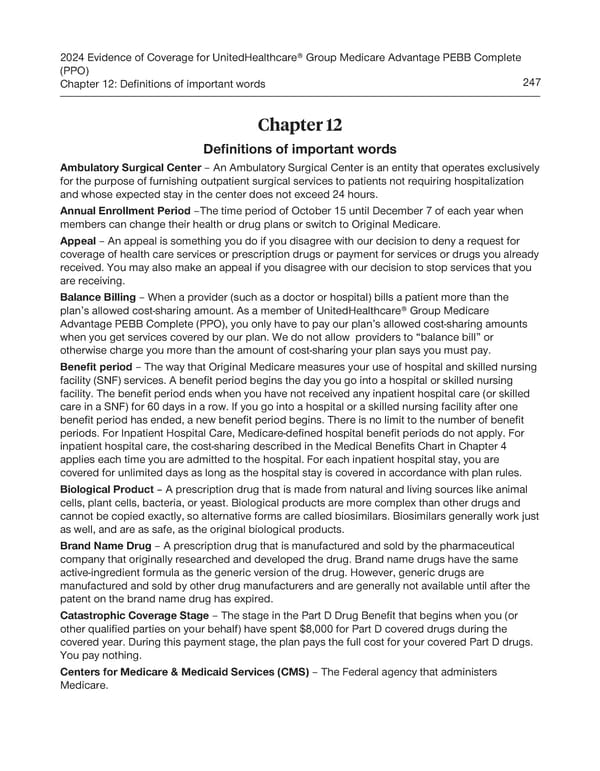2024 Evidence of Coverage for UnitedHealthcare® Group Medicare Advantage PEBB Complete (PPO) Chapter 12: Definitions of important words 247 Chapter 12 Definitions of important words Ambulatory Surgical Center – An Ambulatory Surgical Center is an entity that operates exclusively for the purpose of furnishing outpatient surgical services to patients not requiring hospitalization and whose expected stay in the center does not exceed 24 hours. Annual Enrollment Period –The time period of October 15 until December 7 of each year when members can change their health or drug plans or switch to Original Medicare. Appeal – An appeal is something you do if you disagree with our decision to deny a request for coverage of health care services or prescription drugs or payment for services or drugs you already received. You may also make an appeal if you disagree with our decision to stop services that you are receiving. Balance Billing – When a provider (such as a doctor or hospital) bills a patient more than the plan’s allowed cost-sharing amount. As a member of UnitedHealthcare® Group Medicare Advantage PEBB Complete (PPO), you only have to pay our plan’s allowed cost-sharing amounts when you get services covered by our plan. We do not allow providers to “balance bill” or otherwise charge you more than the amount of cost-sharing your plan says you must pay. Benefit period – The way that Original Medicare measures your use of hospital and skilled nursing facility (SNF) services. A benefit period begins the day you go into a hospital or skilled nursing facility. The benefit period ends when you have not received any inpatient hospital care (or skilled care in a SNF) for 60 days in a row. If you go into a hospital or a skilled nursing facility after one benefit period has ended, a new benefit period begins. There is no limit to the number of benefit periods. For Inpatient Hospital Care, Medicare-defined hospital benefit periods do not apply. For inpatient hospital care, the cost-sharing described in the Medical Benefits Chart in Chapter 4 applies each time you are admitted to the hospital. For each inpatient hospital stay, you are covered for unlimited days as long as the hospital stay is covered in accordance with plan rules. Biological Product – A prescription drug that is made from natural and living sources like animal cells, plant cells, bacteria, or yeast. Biological products are more complex than other drugs and cannot be copied exactly, so alternative forms are called biosimilars. Biosimilars generally work just as well, and are as safe, as the original biological products. Brand Name Drug – A prescription drug that is manufactured and sold by the pharmaceutical company that originally researched and developed the drug. Brand name drugs have the same active-ingredient formula as the generic version of the drug. However, generic drugs are manufactured and sold by other drug manufacturers and are generally not available until after the patent on the brand name drug has expired. Catastrophic Coverage Stage – The stage in the Part D Drug Benefit that begins when you (or other qualified parties on your behalf) have spent $8,000 for Part D covered drugs during the covered year. During this payment stage, the plan pays the full cost for your covered Part D drugs. You pay nothing. Centers for Medicare & Medicaid Services (CMS) – The Federal agency that administers Medicare.
 UnitedHealthcare PEBB Complete EOC (2024) Page 252 Page 254
UnitedHealthcare PEBB Complete EOC (2024) Page 252 Page 254